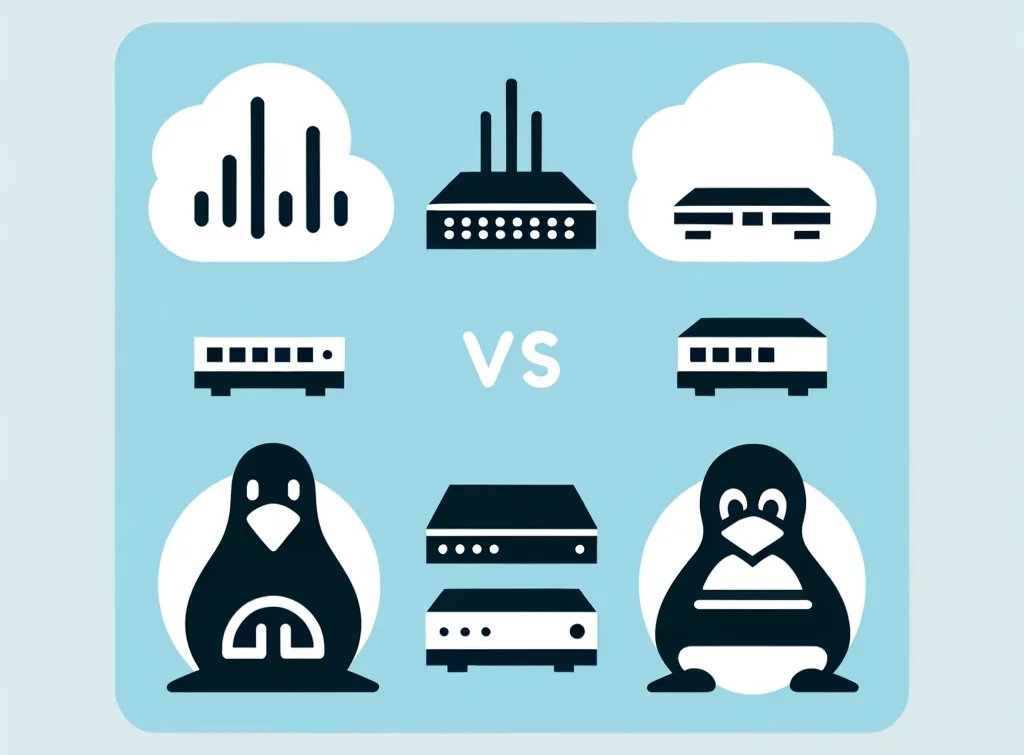Choosing between Cisco and Linux is like deciding between a swiss army knife and a samurai sword – both are incredibly powerful but serve very different purposes. As you stand at the fork in the career path, perplexed by the myriad of possibilities and the fear of choosing wrong, know this: you aren’t alone in this conundrum. In this blog post, we’re going to explore the ins and outs of a career centered around Cisco and Linux. We promise robust insights that will help YOU make an informed decision about which tech titan could be the lynchpin of your professional future.
What’s The Big Deal About Cisco and Linux?
In the realm of IT, two major powerhouses stand out: Cisco and Linux. Each commands great respect, reflecting just how vital they are to the nuts and bolts of modern computing and internet infrastructure.
When we talk about Cisco, we’re referring to the juggernaut of networking gear. Think routers, switches, and security appliances — gizmos that keep the digital traffic flowing smoothly. Cisco isn’t just about hardware, though; it’s also a major player in networking software and offers a robust suite of certifications that are practically industry currency.
On the flip side, we’ve got Linux — the poster child of open-source innovation. Linux sits at the heart of countless servers, runs on supercomputers, and is integral to the backbone of the internet. Its reputation for stability and security is top-notch, and its flexibility is a dream for tinkerers and developers alike.
Bottom line: both Cisco and Linux pack a punch in the IT industry. They’re not just relevant; they’re foundational to so much of the technology we rely on every day.
Do You Prefer Structure or Freedom?
Now, let’s chat about paths. If you’re eyeing a career involving Cisco, picture a well-marked trail with signposts at every key turn. Cisco’s certification ladder is structured, clear, and well-regarded. As you climb from CCT (Cisco Certified Technician) to the lofty heights of CCIE (Cisco Certified Internetwork Expert), each step is a milestone that shouts your expertise to the world.
But what if you’re the type to blaze your own trail? That’s where a Linux career can sparkle. Without a standard certification roadmap, you’re free to explore, to soak in knowledge from a myriad of sources, and to tailor your skill set to what ignites your passion. It’s a landscape that appeals to self-starters; those who revel in digging deep and getting their hands virtually dirty.
Understand your learning style and your career aspirations to make the choice that suits you. Are you after a clear route with recognizable checkpoints, or does the idea of a self-directed quest get your blood pumping? The answer could be your north star in crafting a career that’s personally rewarding.
Can You Mix and Match Cisco and Linux Skills?
The million-dollar question: is it possible to become a networking ninja with a Linux katana? Absolutely. Meshing Cisco and Linux skills isn’t just possible; it’s like having the best of both worlds, opening doors to career opportunities you might never have even considered.
Here’s the secret sauce — most networking environments aren’t one-trick ponies. They’re eclectic mixes of technologies where Cisco hardware may run alongside servers humming with Linux. By mastering both, you become the IT equivalent of a Swiss Army knife, versatile and indispensable.
Learning Cisco gets you up close and personal with industry-standard hardware and protocols, while Linux finesse gives you the prowess in systems administration, automation, and perhaps even contributions to open-source projects. Cross-pollinating these skills can propel you into roles like DevOps engineer, systems administrator, network engineer, or even security specialist.
Professionals with this combo can craft nuanced solutions that might escape specialists siloed in just one realm. And that’s a rare breed — the sort that’s highly sought after for their holistic understanding of IT ecosystems.
Balancing Cisco frameworks with the “free spirit” of Linux creates pros who not only respond to today’s challenges but also shape the solutions of tomorrow. This unique mix is the spice that can set you apart in a competitive job market, arming you with a toolkit designed for the digital age.
Stay tuned, as we’ve only scratched the surface. Pondering a career with Cisco, Linux, or a bit of both, means looking further into how you can turn those tech puzzles into career opportunities — without feeling like you’re just a cog in the machine. Keep your eyes peeled for more insights that’ll help you map out the IT journey that’s right for you.
What Career Opportunities Await in Each Field?
When you’re poised at the crossroads of Cisco and Linux, each path offers a unique set of career opportunities. Let’s explore the lay of the professional land:
Cisco Career Path: – Network Engineer: Deep-dive into troubleshooting, implementation, and managing networks. – Cybersecurity Specialist: Protect networks from threats by deploying Cisco security solutions. – Systems Administrator: Handle Cisco systems supporting enterprise tech environments. – Technical Support Engineer: Be the go-to problem-solver for Cisco products and services.
In terms of career growth, Cisco professionals can often climb the corporate ladder to become IT Directors or CTOs. According to the U.S. Bureau of Labor Statistics, network and computer systems administrator jobs are expected to grow 5% from 2019 to 2029. Salaries range widely based on experience and location, but on average, you might expect to earn upwards of $70,000 annually, with those in more senior roles or in areas with a high cost of living pulling in six figures.
Linux Career Path: – Linux System Administrator: Keep servers running smoothly and securely. – DevOps Engineer: Use your Linux skills to streamline the development pipeline for faster deployment. – Software Developer: Create software for Linux systems, or use Linux as a development platform. – IT Architect: Design complex Linux-based IT systems for scalability and efficiency.
If you lean towards Linux, you might find your journey full of potential for growth into roles like Senior Systems Architect or even a move into the open-source software community leadership. The rise of cloud computing and big data has accelerated the demand for Linux professionals. According to Payscale, Linux System Administrators can see an average salary of around $77,000, with room to grow as you acquire more specialized skills.
How Will Your Choice Affect Your Day-to-Day Work?
Choosing between a future with Cisco or Linux isn’t just about where you might end up, but also about the journey—what your everyday work life will look like.
Working with Cisco: – Expect to be part of a structured environment, often within larger corporations. – You’ll likely focus on specific Cisco products and services. – The work can be process-oriented, with a clear chain of command. – Be prepared for a mix of hands-on hardware work and network management software tasks.
Embracing Linux: – A Linux-focused role offers more diversity; you might work in a startup or a large tech company. – Open-source projects will be your playground, giving you more creative freedom. – You’ll deal more with software and servers, less with physical hardware. – Collaboration is often less hierarchical, welcoming input from various members of the community.
Whether you’ll have a predictable routine or new challenges daily largely depends on the environment the job is in and the specifics of the role itself. But here’s a nugget of wisdom that’s overlooked: Never underestimate the power of company culture fit. Your happiness on the job is as crucial as the technical skills you possess.
What Tools and Resources Will Propel You Forward?
No matter which path you choose, you’ll need to fuel your journey with the right tools and resources. Here’s where you can find the treasure maps and compasses to assist you in your career trek:
For Cisco Aspirants: – Certifications: Dive into Cisco’s Certification Programs, such as the CCNA or CCNP, to validate your expertise. – Courses: Check out platforms like Udemy or LinkedIn Learning for a variety of courses. – Forums: Engage with fellow professionals on the Cisco Community or Reddit’s /r/Cisco.
Certifications might require a financial and time investment ranging from a few hundred to a few thousand dollars.
For Linux Enthusiasts: – Certifications: Obtain credibility with certifications like CompTIA Linux+ or Red Hat Certified System Administrator. – Courses: Open-source learning platforms like edX offer Linux courses designed by industry leaders. – Communities: Joining the Linux Foundation or niche forums like LinuxQuestions.org can boost your network and knowledge.
Now, here’s the insider hack: For Linux, sharpening your scripting and automation skills through practical, real-world problems can set you apart. Start by contributing to open-source projects—not only will you gain invaluable experience, but you’ll also build a reputation within the community.
No matter where your career compass points, the opportunities in both Cisco and Linux are plentiful. It’s up to you to grab the reins and steer your career in the direction that resonates most with your vision. Remember that while certs might open doors, it’s your hands-on experience and problem-solving prowess that will secure your place in the tech world. Have fun, never stop learning, and may you have an adventure that’s as rewarding as it is educational!
Is There a Clear Winner for Career Advancement?
When weighing the prospects of Cisco and Linux for career advancement, it’s akin to comparing apples and oranges; each has its own flavor and appeal. But you’re not here for clichés—you want the nitty-gritty to make your decision.
Continuing Education
Staying relevant in the tech world is like running on a treadmill that keeps getting faster. You’ve got to keep up or you’ll be thrown off.
For Cisco enthusiasts, their Certification programs—from CCNA to CCNP and CCIE—are the gold standard. These certs are evolving, keeping pace as the networking landscape shifts toward automation and software-defined networking. The key to career growth here lies in never resting on your laurels; always eye the next cert or specialization that can vault you forward.
Linux pros have a different path. With open-source technology expanding like the universe, there’s limitless potential. Dive into Red Hat or CompTIA certifications, or get your hands dirty with emerging technologies like containers (Docker, anyone?) or orchestration tools (hello, Kubernetes). The landscape is your oyster.
Professional Networking
They say it’s not what you know, but who you know. In both fields, creating a strong professional network can turbo-charge your career.
For Cisco folks, get cozy with the Cisco Learning Network. It’s overflowing with peers, mentors, and opportunities. Don’t forget about LinkedIn groups, subreddits and even Facebook groups. These spaces can lead to job opportunities, project collaborations, and invaluable advice.
Linux enthusiasts, on the other hand, thrive in the open-source community’s camaraderie. Join a local Linux User Group (LUG), contribute to forums, or attend events like the Linux Foundation’s LinuxCon. You might collaborate on a project on GitHub one day and find yourself being scouted the next. That’s the power of open-source networking.
The Role of Technological Evolution
Here’s the kicker: technology moves at warp speed, and only those strapped in for the ride will get to the helm.
Cisco is deeply enmeshed in the Internet of Things (IoT), cybersecurity, and cloud services. A Cisco career can slingshot you into these domains if you’ve got an eye for the next big thing—think cybersecurity certifications or cloud networking expertise.
Linux skills are like a Swiss Army knife in the evolving tech space. You can pivot to in-demand areas such as cloud computing (ever heard of AWS, based on Linux?), DevOps, and cybersecurity.
So, who’s the winner? Both are, in different rights. It boils down to your passion, adaptability, and willingness to embrace the whirlwind of change.
But here’s the golden nugget of advice most bloggers miss: Look beyond certifications and knowledge – develop your soft skills. Communication, project management, and leadership can set you apart in either Cisco or Linux careers. No number of certifications can substitute for the ability to lead a team, manage a crisis, or present a project idea persuasively.
Practical tip: If you’re looking to beef up those soft skills, consider joining a group like Toastmasters or volunteering to lead projects or presentations at your current job.
In conclusion, there’s no one-size-fits-all answer in the Cisco vs. Linux debate. Like a skilled surfer, ride the waves of both fields and you might just find your perfect career pipeline. Follow your interests, play to your strengths, and keep that keen edge of curiosity sharp—you’ll find that opportunities for advancement are plentiful.
Quick Summary
Embark on your IT odyssey with a compass of clarity and confidence, steering through the Cisco and Linux landscapes:
- Certification Quest or Creative Conquest: Cisco offers a structured certification journey; Linux champions open-source exploration.
- Hybrid Heroism: Combine Cisco’s networking prowess with Linux’s system mastery to become the ultimate IT champion.
- Passion Pivot: Align your career compass with your personal interests, ensuring job fulfillment and industry relevance.



